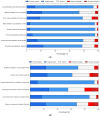A Cross-Sectional Study Assessing Antibiotic Resistance Awareness Among University Students in Samborondón, Greater Guayaquil, Ecuador
- PMID: 40426507
- PMCID: PMC12108333
- DOI: 10.3390/antibiotics14050440
A Cross-Sectional Study Assessing Antibiotic Resistance Awareness Among University Students in Samborondón, Greater Guayaquil, Ecuador
Abstract
Background/Objectives: Education on antibiotic use has the potential to positively shape the practices and perspectives of future professionals. Assessing awareness levels of antibiotic resistance among university students is, therefore, critical, as they represent a vital demographic capable of influencing public health outcomes, especially in low- and middle-income countries. Methods: This cross-sectional study employed the World Health Organization's Antibiotic Resistance: Multi-Country Public Awareness Survey, which examines demographics, antibiotic use, knowledge, perspectives, and sources of information. A total of 922 surveys were collected from students across various disciplines at two universities in Greater Guayaquil. Results: Most participants reported obtaining antibiotics through healthcare professionals, adhering to proper usage instructions, and purchasing them primarily from pharmacies. However, only 56% of the responses were correct, with many students incorrectly associating antibiotic use with conditions where they are typically ineffective. Despite these gaps, the students expressed positive attitudes toward proposed measures to address antibiotic resistance. While the participants demonstrated familiarity with terms related to antibiotic resistance and identified doctors and educators as their main sources of information, educational campaigns were not widely recognized as important. Conclusions: These findings evidence knowledge gaps among an essential group, suggesting the need for targeted health programs, preventive strategies, and educational initiatives to combat misinformation regarding antimicrobial resistance.
Keywords: Ecuador; KAP; antibiotic resistance awareness; cross-sectional survey; health literacy; students.
Conflict of interest statement
The authors declare no conflicts of interest.
Figures


Similar articles
-
Antibiotic Resistance Awareness among Undergraduate Students in Quito, Ecuador.Antibiotics (Basel). 2022 Feb 3;11(2):197. doi: 10.3390/antibiotics11020197. Antibiotics (Basel). 2022. PMID: 35203800 Free PMC article.
-
Is health literacy associated with antibiotic use, knowledge and awareness of antimicrobial resistance among non-medical university students in Egypt? A cross-sectional study.BMJ Open. 2021 Mar 1;11(3):e046453. doi: 10.1136/bmjopen-2020-046453. BMJ Open. 2021. PMID: 33649060 Free PMC article.
-
Pharmacies and use of antibiotics: a cross sectional study in 19 Arab countries.Antimicrob Resist Infect Control. 2024 Sep 18;13(1):104. doi: 10.1186/s13756-024-01458-6. Antimicrob Resist Infect Control. 2024. PMID: 39294829 Free PMC article.
-
Assessing the knowledge, attitudes and practices of healthcare staff and students regarding disposal of unwantead medications: a systematic review.BMJ Open. 2024 Dec 23;14(12):e093636. doi: 10.1136/bmjopen-2024-093636. BMJ Open. 2024. PMID: 39719285 Free PMC article.
-
Surveys of knowledge and awareness of antibiotic use and antimicrobial resistance in general population: A systematic review.PLoS One. 2020 Jan 16;15(1):e0227973. doi: 10.1371/journal.pone.0227973. eCollection 2020. PLoS One. 2020. PMID: 31945117 Free PMC article.
References
-
- World Health Organization . Global Plan on Antimicrobial Resistance. WHO Press; Geneve, Switzerland: 2015. pp. 1–28.
-
- Baekkeskov E., Rubin O., Munkholm L., Zaman W. Oxford Research Encyclopedia of Politics. Oxford University Press; Oxford, UK: 2020. Antimicrobial Resistance as a Global Health Crisis.
Grants and funding
LinkOut - more resources
Full Text Sources

